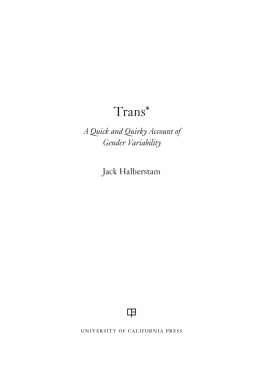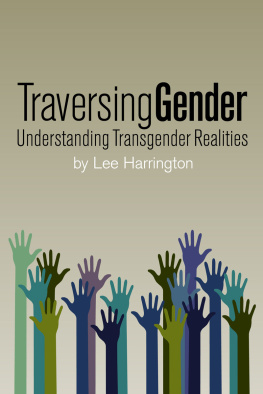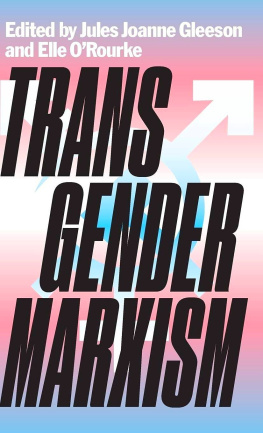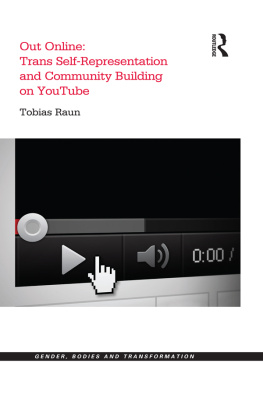OVERVIEW
Traces the historical legacies of categorization and classification as they pertain to the transgender body, with a focus on the importance of naming and un-naming. Classification systems connect with colonial strategies for knowing and governing.
PathologizationLegacies of ClassificationRepresentation
Surgeries both make and unmake trans* bodies. Not all trans* people have surgeries; not all surgeries are successful; some trans* people participate in the global market for cosmetic surgical tourism.
SurgeryBodily ArchitecturesTheories of Embodiment
Trans* children are the new frontier for rights, recognition, and medical intervention. This has favorable and unfavorable consequences for trans* activism.
Trans* ChildParentingTrans* Defined
Trans* kinship across generations has been important in the past, but currently parents have stepped into the role of elders to younger generations of trans* teens. This has the unfortunate impact of cutting trans* children off from trans* history itself.
Generational StruggleHousesKinship
Representations of trans* people in film and on TV have tended to portray gender variant bodies as mad, bad, and dangerous. This changed in the 1990s when we saw a slew of films that addressed real struggles in trans* lives. Currently, new generations of trans* activists contest older films in favor of positive images, with sometimes disastrous effects.
Cross-Generational ConnectionsQueer Energy/AngerRepresentation
Feminisms and trans* activisms have historically been cast as opposed, at odds, in conflict. The conflict is undeniable and radical feminist critiques of trans* women have done serious damage, but it may be time to look for grounds for collaboration and solidarity.
FeminismTrans* FeminismSolidarity
What can The Lego Movie tell us about building new worlds, about architecture, and about trans* relations to bodies and selves?
Trans* ArchitectureLegosElementsPiece of Resistance
How to play fast and loose with pronouns.
PREFACE
Youve got your mother in a whirl
Shes not sure if youre a boy or a girl.
David Bowie, Rebel, Rebel (1974)
I started writing this book the day that David Bowie died. I found it strange to feel so sad about the loss of a person I had never met, but Bowie for me, as for so many people, represented the possibility of stretching beyond social norms and hackneyed cultural forms of expression and generic expectations. He embodied a deeply seductive and intelligent version of popular culture and managed to wed subversion to accessibility, rebellion to credibility, and transformation to performance. Over the course of a long and varied career in music and performance, David Bowie was able to sustain, with considerable vigor, a meaningful and lasting relation to musical experimentation, and he was able to articulate those experiments through bodily gestures and a series of ambiguously gendered personae. It is no accident that David Bowies appeal, and many of his lyrics, were explicitly futuristic. His own gendered appearancepart man, part woman, part space alienspoke of forms of life that extended far beyond the everyday understandings of men and women that circulated in the 1960s and 1970s when he began his journey into pop stardom.
Bowie is a perfect figure for the kinds of experiments in gender and embodiment that concern me in this book. Rather than giving a neat, chronologically ordered account of the emergence of transgender communities and trans visibility in the twenty-first century, I want to chart the undoing of certain logics of embodiment. When logic that fixes bodily form to social practice comes undone, when narratives of sex, gender, and embodiment loosen up and become less fixed in relation to truth, authenticity, originality, and identity, then we have the space and the time to imagine bodies otherwise.
Only a few months after Bowies unexpected demise, another celebrity death shocked the world. Prince, the purple provocateur from Minneapolis, died too young of a drug overdose. Like Bowie, Prince had pioneered a gender-bending style that both emphasized his virtuosity and uniqueness and brought out a queerness, or sexual excess, and a transness, or gender ambiguity, that exceeds simple divisions between gay and straight or trans and cis and that offered access to complex, polyrhythmic worlds of love, lust, apocalypse, and heartbreak. Prince, a favorite icon for drag kings in the nineties and a figure so unclassifiable that for a while he refused a name and instead was known by a symbol, combined an authoritative ability to improvise and innovate with a playful tendency to flirt and seduce. For performers like Prince and Bowie, the opposing tendencies that our culture has placed in separate boxes were easily conjoined on behalf of, often, otherworldly productions of identity.
The sign that Prince used for a while to stand for his performance persona, a symbol commonly known as the love symbol, combined the signs for man and woman. Prince used the symbol By using an unpronounceable symbol, Prince felt that he could interrupt the labels plan for squeezing the maximum amount of profit out of his work. By calling attention to the unjust ownership of Black music by white-run labels, and by recognizing that this ownership of Black culture extends through the gender-stabilizing insistence on naming and classification, Prince refused to obey the laws of gender, genre, or generic marketing. In his music, too, Prince sidestepped conventional gendered performances, and he inhabited a vocal range that veered abruptly from low growls to falsetto trills. Shifting and switching between styles, voices, soul, funk, rock, and punk, Prince likewise represents the gendered complexity to which, in the realm of popular culture, audiences are already attuned.












